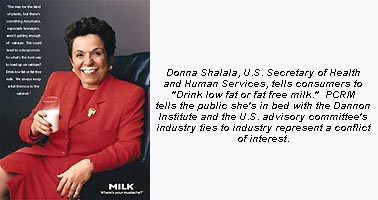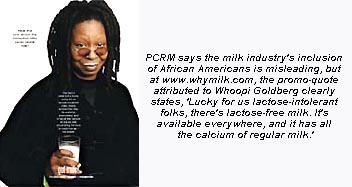Doctor-Activists Sue U.S. Government, Seek Reduced Dietary Role for Dairy

Table of Contents
Minority Health
The Industry-Government View
Conflicts of Interest?
Summary of the Lawsuit
Much Ado About Mustaches
A doctor-led advocacy group is suing the U.S. government in a suit that, if successful, could reduce the role of dairy products in the American diet. The Physicians Committee for Responsible Medicine (PCRM), which filed the suit Dec. 15 in the U.S. District Court for the District of Columbia, alleges that industry-government ties are too close and that the government is overlooking the dietary needs of minority populations.
The lawsuit names Dan Glickman, Secretary, Dept. of Agriculture (USDA) and Donna Shalala, Secretary, Dept. of Health and Human Services (DHHS), as the defendants.

This case is being brought under the Federal Advisory Committee Act (FACA), which applies to all federal advisory committees and includes the Dietary Guidelines Advisory Committee for the Year 2000. (See section, Summary of the Lawsuit)
Along with the Food Guide Pyramid, these guidelines provide nutritional advice for U.S. citizens and form the basis of all federal food programs, including the National School Lunch Program which feeds 26 million children a day.
PCRM is particularly opposed to "a powerful 11-member federal advisory committee" appointed to revise the Dietary Guidelines for Americans. The suit's intent is to force the USDA and HHS to appoint a new advisory panel, or to add members who will speak for the health interests of minority Americans.
The group's stance is that because several committee members have ties to the food industry, the government cannot act in the public interest. (See section, Conflicts of Interest?)
"We have uncovered evidence that at least six of these committee members have had or currently have significant ties to the meat, dairy, or egg industries," says Mindy Kursban, PCRM staff counsel. "And we have good reason to believe the government has intentionally withheld documents revealing conflicts of interest."
PCRM President Neal D. Barnard, M.D., alleging an illegal conflict of interest, said, the advisory committees' work and the public's health are "clearly" compromised. "As health professionals concerned with the staggering levels of illness in this country, these industry ties are particularly hard to swallow."
Minority Health
PCRM is also suing the USDA and the DHHS for promoting dietary guidelines that undermine minority health.
In a national campaign launched last spring, PCRM is asking the government to acknowledge that minorities suffer from higher rates of prostate cancer, diabetes, and other chronic diseases than Caucasians and to promote diets low enough in fat and rich enough in plant products to reduce their risk of these conditions.
Additionally, PCRM is asking the government to make dairy strictly optional, acknowledging that the majority of African-, Hispanic-, Asian-, and Native-Americans are lactose-intolerant, and that they may wish to choose other sources of calcium.
PCRM's political allies for the proposal to change the dietary guidelines—and who have endorsed PCRM's actions—include the Congressional Black Caucus Health Braintrust; the NAACP; former U.S. Surgeon General M. Joycelyn Elders, M.D.; Martin L. King, III; Congressman Jesse Jackson, Jr.; Muhammad Ali; and other community leaders and minority health advocates.
The Industry-Government View
The industry and government view of this issue can be summed up thusly: The guidelines are not a mandate to all Americans; the advisory board includes industry experts because that is where the experts happen to "live" and there are several alternate guidelines in public circulation for those with special dietary needs.
Furthermore, yogurt and other cultured or probiotic dairy products are freely available to those with lactose intolerance. While leafy green vegetables also contain calcium, dairy products are the number-once source of dietary calcium; lessening the role of dairy in the guidelines could trigger a heightened calcium-intake problem for the majority of the population.
Finally, the USDA solicited experts for its advisory committee appointments through an open Federal Register notice and were intended to provide a balance of technical expertise in medicine, nutrition and epidemiology.
Conflicts of Interest?
Government committee members were chosen—or, as PCRM says, "were to have been appointed"—based on their scientific knowledge of human nutrition. Out of the 11 members appointed, six "currently have, or have had in the recent past, financial ties to the meat, dairy, or egg industries. Even the Deputy Undersecretary of Agriculture, who participated in the Committee meetings, has a business relationship with a dairy-product manufacturer (the Dannon Institute)."
Whether this is right or wrong, PCRM sees conflicts of interest in the appointment of too many industry experts. The following bullet points show who "has ties," in PCRM-speak, to industry organizations:
• Cuberto Garza has had ties with the National Dairy Council, Mead Johnson, the Nestle Company, and the Dannon Research Institute, Inc.;
• Richard Deckelbaum has had links with Mead Johnson, the National Dairy Promotion and Research Board, the Nestle Company, the National Live Stock and Meat Board, and the Slim-Fast Nutrition Institute.
• Scott Grundy serves on the American Egg Board Grant Review Committee; Johanna Dwyer has had ties with the National Dairy Council, the American Meat Institute, and the National Dairy Promotion and Research Board;
• Rachel Johnson has received grant support from Dairy Management, Inc.; and
• Ronald Weinsier has received grant support from Mead Johnson.
Summary of the Lawsuit
FACA requires that the Committee be balanced in terms of points of view represented and the function to be performed, and prohibits the inclusion of members with inappropriate special interests to assure that the advice and recommendations of the advisory committee will not be inappropriately influenced by any special interest, but will instead be the result of the advisory committee's independent judgment.
The committee was established by the USDA and the HHS to recommend revisions to the current Dietary Guidelines, last revised in 1995. The committee's recommendations are to be given to the Secretaries of Agriculture and Health and Human Services who, we anticipate, will adopt most or all of the recommendations and publicly issue them as the Dietary Guidelines for the Year 2000.
The Dietary Guidelines for Americans provide recommended nutritional and dietary information for all Americans. The Dietary Guidelines form the basis for all federal food assistance or nutrition programs, including the School Lunch Program, the School Breakfast Program, the Food Stamp Program, and the Special Supplemental Nutrition Program for Women, Infants, and Children (WIC). For example, current federal regulations mandate that all school nutrition programs, which serve meals daily to 26 million American children, follow the Dietary Guidelines.
Moreover, the Food Guide Pyramid is included in the current guidelines and serves as an educational tool and/or meal planning guide in schools, hospitals, maternal and child health programs, senior citizen programs, supermarkets, churches, and schools of nutrition.
Much Ado about Mustaches
This past June, the PCRM took aim against the National Fluid Milk Processor Promotion Board, filing a complaint with the Federal Trade Commission challenging health claims in the "Milk Mustache" advertising campaign. The organization challenged the implication that drinking milk can lower the risk of osteoporosis, prevent high blood pressure, and improve sports performance.
PCRM cited studies that "provide no evidence of benefit from increased calcium intake for African Americans, males, or older women," specifically complaining about the use of African American celebrities such as Spike Lee, model Tyra Banks and Whoopi Goldberg.

PCRM president Neal D. Barnard, M.D., said in June, "The public has no idea that African Americans have been excluded from nearly every research study because of better bone density. It is scientifically indefensible for milk ads to then suggest that African Americans benefit from drinking milk. The same is true for males as a group and for older women."
Patricia Bertron, R.D., director of nutrition at PCRM agrees. "For those who are at risk for osteoporosis, it is important to recognize that bone loss cannot be prevented nor cured by simply drinking a glass of milk. I believe the ads grossly oversimplify the disease."]
Another, 12-year 1997 Harvard study of more than 75,000 nurses, found that those who got more calcium from milk actually broke more bones than those who got less calcium in their diets, PCRM said.
